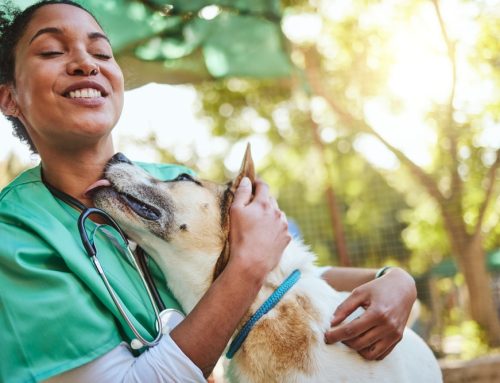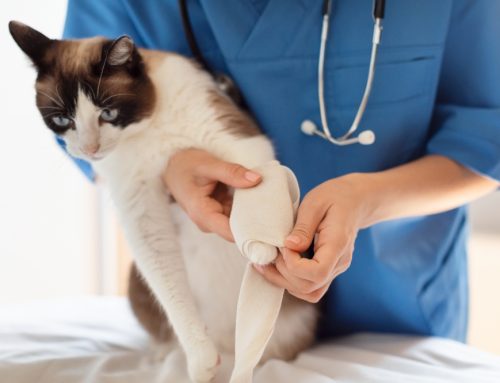Your pet is more than just a companion—they are a cherished member of the family. Just as you take every measure to ensure your two-legged family’s well-being, it’s essential to also make your pet’s health a top priority. At Lytle Veterinary Clinic, we understand the deep bond you share with your four-legged companion, and we’re here to help you keep them in tip-top shape. Here are five steps you can take to keep your pet healthy.
#1: Keep your pet’s next wellness visit
You may be tempted to skip your pet’s annual check-up, especially if they seem healthy. But, not so fast—regular wellness visits are the cornerstone of pet health. During these visits, our veterinary team will perform a thorough physical exam, administer immune-boosting vaccinations, and offer guidance on nutrition and overall well-being. Like your annual physical, your pet’s wellness visit gives you an opportunity to ask us about any concerns you might have, and allows us to check your pet for any signs of disease.
#2 Say yes to disease screening
Wellness visits also provide an opportunity for us to detect any health issues in the early stages when treatment can be more successful. Although a physical exam is a good start, we may recommend screening tests to more thoroughly assess your pet’s overall health. Typical wellness diagnostics include:
- Blood work — Blood work allows us to evaluate the health of your pet’s various organ systems and can alert us to conditions such as kidney or liver disease, diabetes, or thyroid issues before they cause clinical disease. For dogs, we also recommend testing for heartworm disease, Lyme disease, ehrlichiosis, and anaplasmosis.
- Urinalysis — Your pet’s urine is a treasure trove of information. It can provide clues about their urinary health and help us diagnose conditions such as urinary infections, bladder stones, and kidney disease.
- Fecal exam — We will test your pet’s feces for a variety of intestinal parasites that can cause gastrointestinal (GI) issues.
These preventive measures allow us to catch potential issues early so we can start a treatment or management plan that ensures your pet continues living their best life possible.
#3: Schedule your pet’s dental cleaning
During each wellness visit, we will assess your pet’s oral health and recommend a dental cleaning if we notice dental disease signs. Your pet’s oral health is more than fresh breath—it’s a critical component of their overall well-being. Dental problems can cause chronic pain, infection, tooth loss, and even organ damage.
During your pet’s professional dental cleaning, we will remove tartar and plaque buildup, and address any diseased teeth. We will also take dental X-rays, which provide valuable information about any tooth root issues below the gumline. Once your pet’s teeth are cleaned, you can begin daily toothbrushing at home to ward off future dental disease.
#4: Don’t skip your pet’s parasite prevention
Parasites can pose serious health risks to your pets and can even transmit diseases to you and your family. It is essential to provide year-round protection from the following parasites:
- Fleas — Fleas can cause intense itching, and can quickly infest your home. They can also transmit tapeworms if your pet accidentally ingests one while grooming.
- Ticks — Ticks can transmit many diseases, including Lyme disease, ehrlichiosis, anaplasmosis, and Rocky Mountain spotted fever.
- Heartworms — Heartworms, which are passed by mosquitoes, cause deadly heart and lung disease in dogs and cats.
- Intestinal parasites — Intestinal parasites such as roundworms, hookworms, and whipworms can cause GI problems.
Regular preventive treatments are highly effective in keeping these pesky invaders at bay, ensuring your pets remain comfortable and healthy. Our team can recommend safe prevention products that best fit your pet’s needs.
#5: Fit in regular exercise with your pet

Like you, your pet benefits from regular exercise to maintain a healthy weight and promote overall fitness. Exercise helps prevent obesity-related health issues, such as arthritis, diabetes, and heart problems. It also provides mental stimulation, which reduces stress and prevents boredom-related behavioral problems. Your dog will enjoy daily walks or a game of fetch in the backyard. Cats may not be as eager to exercise, but you can usually coax them to get moving by appealing to their inner hunter—try a motorized mouse toy or a feather wand.
We know that your pet’s health is your top priority, and these steps can help you safeguard their well-being. At Lytle Veterinary Clinic, we’re dedicated to helping you provide the best care possible for your furry family member. Give us a call if your pet is due for their next wellness visit or if you have questions about keeping them healthy.







Leave A Comment